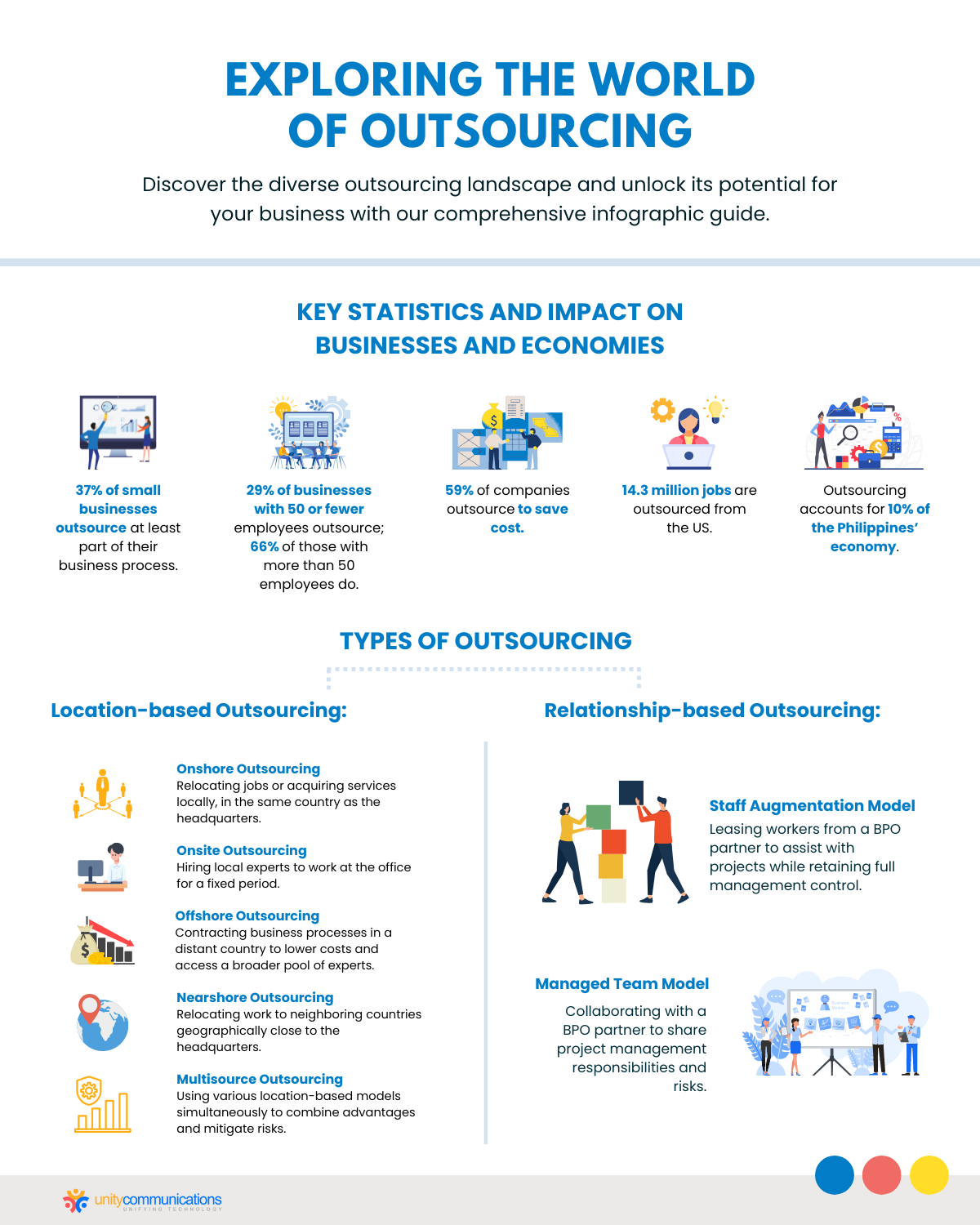Table of Contents
Business process outsourcing (BPO) has fueled remarkable growth across industries, helping businesses of all sizes—even startups—compete in the global marketplace. In fact, 37% of small businesses now outsource a core function to stay agile and competitive. The economic advantages of outsourcing make it a strategic choice for any business aiming to grow sustainably.
For startups seeking to expand their global reach or mid-sized companies preparing for international growth, staying competitive can be challenging. Balancing a growing workforce while enhancing core business competencies often feels overwhelming, especially as operational costs increase.
If you’re wondering why so many companies choose outsourcing, read on to discover how it can benefit your business.
What Is Outsourcing?

Outsourcing is a strategic decision a company takes to ensure business continuity and growth. It is a practice wherein companies acquire products and services from a third-party company, freelancer, or BPO company that is otherwise being done in-house.
The outsourced services or products are often non-core or non-critical business functions that take time and effort. The tasks or projects that need highly skilled experts are often too expensive for companies to hire. Additionally, for special projects that are not done regularly, hiring a freelancer or contractual is seen as more practical than getting one in-house.
What Business Service Can Be Outsourced?
Companies can outsource one individual, a part of a department, the whole department, and sometimes, an entire business function to instantly expand the business skill set. Because of this, they can also acquire the services of big companies to take care of their logistics, IT department, customer service, technical support, marketing, procurement, and even HR functionalities.
Sub-contracting jobs have been recognized since 1989 and have become an integral part of the business economy. Its popularity has grown as more and more businesses, regardless of their size, consider the benefits. It changed the way companies do business today. It allows them to minimize expenses and gain that much-needed capital to improve and attract investors.
What Are the Different Types of Outsourcing

With the evolution of outsourcing through the years, different types arose to cater to the ever-changing nature of businesses and their needs. To optimize the advantages in business and use it as leverage to stay competitive in your industry, first, you need to assess your business needs. Knowing which part of your business needs spinning off to external resources, the next step is to find out which type of outsourcing will work for you.
Location and relationship are the two primary perspectives. From these two, we derived the different types of outsourcing. Let us take a look at their definitions and how one differs from another.
Location-based Outsourcing
Location-based outsourcing is an aspect that is mainly defined by the distance from the client (a business that acquires a third-party service provider) to that of the outsourced resources.
- Onshore Outsourcing
- Sometimes referred to as onshoring, it is defined as a type of outsourcing where a company relocates jobs or acquires an outsourced service provider locally. It is in the same country as its headquarters. Onshore outsourcing is also known as domestic outsourcing.
- On-site Outsourcing
- On-site outsourcing or on-site is a service acquired from a local company to send experts to the office to work for an agreed fixed period.
- Offshore Outsourcing
- Sometimes referred to as offshoring, is contracting or acquiring a part of your business process in a distant country. It is a strategy to lower labor costs and utilize a broader pool of experts.
- Nearshore Outsourcing
- Also known as nearshoring, it is the relocation of work or jobs in neighboring countries that are geographically close to its headquarters. Businesses that want to reduce communication and time allocation delays take this route.
- Multisource Outsourcing
- Multisource outsourcing or multisourcing involves various location-based models. Businesses use different location-based simultaneously. It combines the advantages of on-site, onshoring, nearshoring, and offshoring and fighting its risks.
- Learn more about multisource outsourcing in this article: The Most Utilized BPO Model.
Relationship-based Outsourcing
Relationship-based outsourcing is a perspective that focuses on the management of ownership and agreement between the business and the BPO service provider.
- Staff Augmentation Model
- The staff augmentation model is also known as extended teams or co-sourced teams. This model allows you to lease workers from your outsourcing partner to help with the project or job. You have complete authority and management over the work done for you.
- Managed Team Model
- The managed team model is a project collaboration between the client and the BPO partner. You get to unload some of the management and decision-making regarding the project to your service provider. The tasks depend on the agreement between parties. Your BPO team works independently from your in-house team. A point of contact- outsourced project manager will be the one to do all the communications from the provider’s end. Your BPO partner gets to share the risks of the project.
- Project-Based Model
- The project-based model is the traditional approach to outsourcing. It is where you hand off the responsibility of a project to your BPO partner.
Other Types of Outsourcing
1. Business Process Outsourcing
Business process outsourcing, or BPO, is the most popular. BPO companies are growing in numbers as more businesses are gearing toward outsourcing. It is the contracting of non-core business functions to a third-party service provider. It deals mainly with repetitive tasks like customer service, technical support, and other administrative tasks.
2. Professional Outsourcing
Professional Outsourcing is contracting services in a specific professional domain from highly skilled experts to work for you and your business. It includes accounting, legal, purchasing, information technology (IT), administrative support, and other specialized services.
3. Manufacturer Outsourcing
Manufacturer outsourcing is acquiring the manufacturing business processing from a third-party service provider. It includes the production of goods or parts that your business needs.
4. Process-Specific Outsourcing
Process-specific outsourcing involves contracting specific tasks, processes, or internal procedures from a third-party company, service provider, or unit specializing in that particular field. The turning over of control of civic services such as fire, police, armed forces, and the likes of not-for-profit corporations is also called process outsourcing.
Importance of Outsourcing
Outsourcing is an important business decision that significantly impacts an organization. It offers powerful versatility without compromising quality. A business will have access to talent not available locally with an accelerated hiring rate. It can easily hire a team of experts or a specialized professional for a fixed time and cost, letting the business grow at its own pace.
The availability of the global workforce is within reach without the pressure of spending above and beyond their means. Tapping on experienced and highly skilled talent is done conveniently with outsourcing. Outsourcing is vital for businesses’ fast-paced processes or operations. It offers cost savings, a solution to capacity issues, convenience, flexibility, increased productivity, and faster-growing sales.
Key Advantages of Outsourcing

Outsourcing brings significant gains to businesses. Most businesses outsource to save money on labor and operating costs. Cost optimization is not the sole reason. Outsourcing is more than minimizing expenses. Find out why companies do outsourcing and how it can help your company.
- Global Pool of Experts: Outsourcing expands your workforce and labor flexibility. It offers broad access to highly skilled professionals and specialists globally. It provides the expertise you need without incurring additional training costs or hiring new staff in-house.
- Increase Economies of Scale: If you are looking for experts in a specialized domain, outsourcing can help you get them. It’ll save you time and effort and increase your productivity and efficiency. It will mean higher profitability for your business.
- Business Adaptability: Outsourcing your business ensures swift response, flexibility, and adaptability to the dynamic environment of the business world. Transitions are a lot easier, as you can hand your tasks, projects, and other operational functionalities to specialized third-party companies.
- Expands Your Business Offering: It helps businesses explore new markets and expand their offerings with the availability of specialized skills and extensive resources. It enables you to flourish on your own time at the amount you can afford without overspending or stretching your resources to lengths.
- Increased Efficiency and Promote Growth: It promotes efficiency, increased profitability, and productivity as specialized skills experts handle your tasks. It promotes business growth and competitive advantage globally by supplementing a team of experts for your expanding business.
- Improve Competitive Niche: Outsourcing helps businesses focus on their core functions by taking the load of their non-critical tasks. It gives businesses more time to improve their core competencies’ strategies and stay on top of the competition.
- Bridge Skill Gap and Delivers Competitive Advantage: When you are a startup or a small business testing the industry’s competition, managing people is challenging. Outsourcing will help you gain access to management and close the skill gap by providing expertise that is otherwise not available in-house. Your BPO service provider will take care of the management and your workforce. Imagine the time, effort, and overhead cost you will save in the long run.
- Control of Overall Cost: Companies usually outsource because of its cost-effectiveness. BPO service providers have highly skilled professionals in their respective specialized domains. They can do tasks efficiently with twice the productivity. The BPO service provider will allow you to hire experienced contractors on your terms without going through the expenses and obligations of hiring an in-house employee. Talking about saving time, costs, and effort!
- Risk Management: Managing and assessing risks is crucial for every business. Depending on the agreement made, the business process service provider will share the liability and risk of the business process, tasks, or project. It will give companies more time to improve and focus on critical business areas.
- 24/7 Production: How convenient is it to sleep knowing your business runs smoothly in the background? Outsourcing gives exactly that advantage. With a global team in different time zones, your business production can operate around the clock. As a result, it provides you and your business with higher value with a lower overall cost.
How Much Do Companies Save by Outsourcing?

The digitized economy created very steep competition for all businesses. A sustainable business model and business adaptability are crucial to survival. It helps to alleviate the challenges the modern market brings. Many companies find reducing operating costs to be their primary motivator to outsource. Let us find out how much companies save by outsourcing.
- In 2022, the global outsourcing market amounted to 261.9 billion U.S. dollars, according to Grand View Research.
- According to research, an average company can save 60% of operating costs with an outsourced individual.
- According to the Deloitte 2023 Global Shared Services Survey, 84% of companies had identified cost deduction as the main objective of outsourcing.
- 71% of the respondents reported process excellence and observed continuous improvement through their SSCs automation programs.
Learn more about how outsourcing can help your business reduce overall costs. Check out the article: cost-benefit analysis of outsourcing.
The Bottom Line

An organization must be decisive and proactive to get ahead of its competition. The global market competition is getting more challenging by the minute. Your business needs to shape up and strengthen its competitive edge. Do not risk getting left behind. Let Unity Communications help you get started with your outsourcing journey. Call us!




